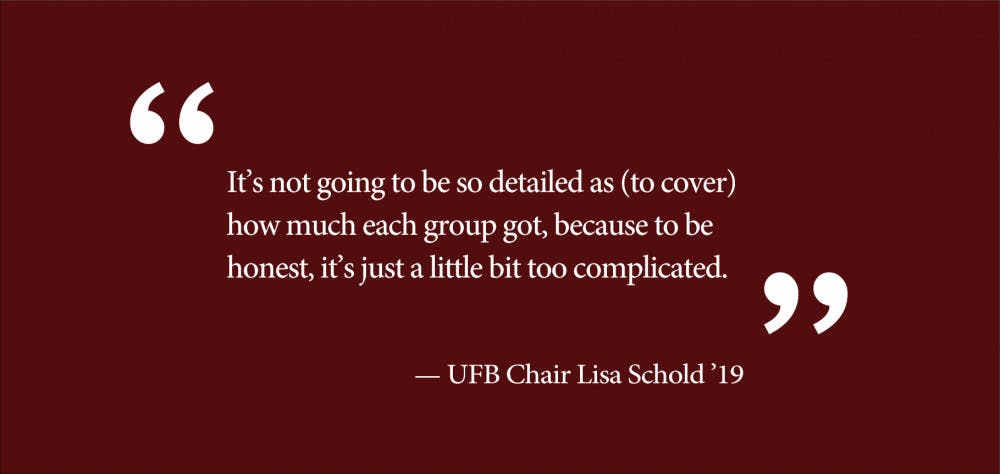The Undergraduate Finance Board will release its first budget report Nov. 21, according to UFB Chair Lisa Schold ’19 and Vice Chair Julian De Georgia ’20.
The report will break down UFB’s spending to give students “a good idea of where the bulk of our funding goes,” Schold said. Schold and De Georgia initially projected that UFB’s report would be completed by the end of September, The Herald previously reported.
UFB is in charge of allocating the revenue raised through the student activities fee, a $286 annual charge that all undergraduates pay. UFB’s approximately $2 million budget funds around 250 student groups on campus along with programming at campus centers like the LGBTQ Center and the Brown Center for Students of Color, according to UFB’s website.
In addition, the Board funds services such as event security and compensates an attorney to advise student groups, De Georgia said.
The report will include information on how UFB distributes its budget through its three primary allocation procedures, De Georgia said. For budget allocation to student groups, the Board’s annual budgeting process occurs primarily in the spring. UFB also continues to distribute funds over the course of the next two semesters through its fall supplemental and spring supplemental budgeting processes.
“It’s not going to be so detailed as (to cover) how much each group got, because to be honest, it’s just a little bit too complicated,” Schold said. Nevertheless, the report will clarify how UFB allocates money.
The report’s publication was delayed while Schold and De Georgia worked with the Student Activities Office to better understand OrgSync, “the accounting system that we use,” De Georgia said.
“We’re just trying to make sure that the numbers that we present are completely accurate,” De Georgia added. UFB is “limited by the data set that (they) have” from OrgSync and cannot currently provide more detailed information on budget allocation, De Georgia said.
But UFB hopes to “break the whole budget down into budget line items” in the future, De Georgia said. For instance, the report could evolve to disclose the amount of money set aside for honorariums, conferences and travel.
Including these line items in the budget report “was our initial goal going into this, but we found that given that (a budget report) had never been done before, there was a lot more foundation work that needed to be done for that,” Schold said.
Schold and De Georgia both committed to publishing budget reports in their respective campaigns for chair and vice chair last spring, The Herald previously reported. The budget report is part of UFB’s work to improve transparency this semester, an effort that also included the launch of a stand-alone website and a call for student feedback on UFB policy.





